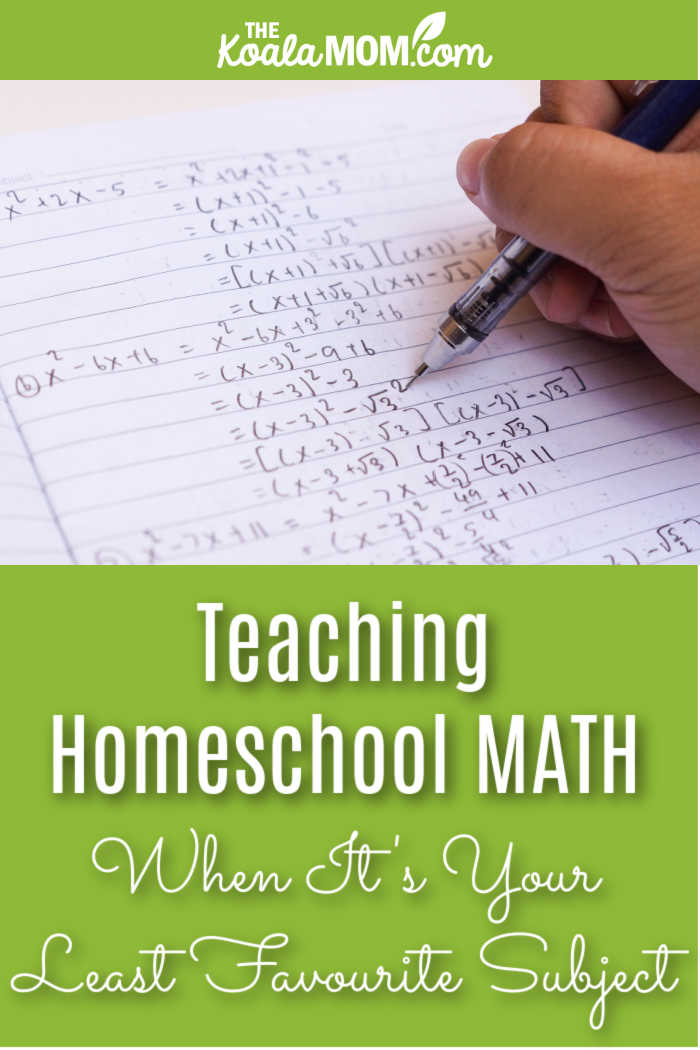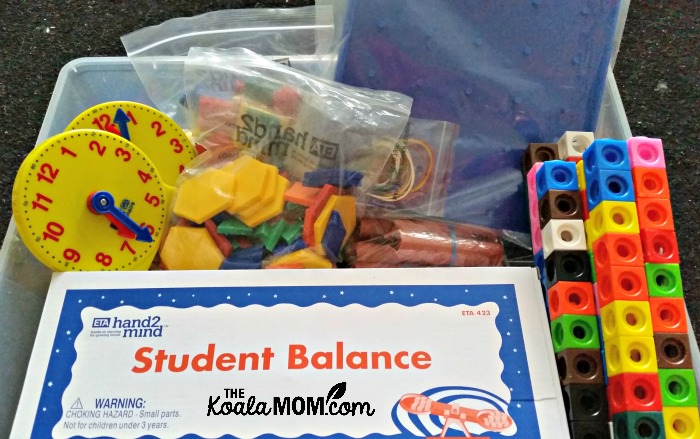One doubt often faced by homeschool parents is how to teach a subject they struggled with in school. For me, that subject is math. All the way through my school years, math was my least favourite subject. Despite that, I’m actually enjoying teaching math to my daughters. Here are my tips for teaching math when it’s not your favourite subject.

This post contains affiliate links; as an Amazon Associate, I earn from qualifying purchases.
Ask for Curriculum Recommendations (or Read Reviews)
There are a lot of math programs available to homeschoolers now. If you aren’t sure where to start teaching math, as your homeschooling friends and read reviews. I love chatting with my fellow homeschool moms about what curriculum they’re using. It’s easy to flip through their books and ask specific questions. Online reviews by homeschool moms are also great places to find information about how a program has worked.
When I was considering a new math curriculum for my oldest, I received several recommendations. Then I went online to read reviews. I enjoyed seeing how other moms used the program, as that gave me a good idea about whether it would work for my daughters.
Check out my online math curriculum reviews:
Look for a curriculum that is user-friendly and sounds interesting to your child. For example, if you have a child who enjoys reading and stories, Life of Fred is likely a good choice. If you have a child who is a hands-on learner, check out Math U See or Saxon Math. If you have an audio or visual learner, then an online program such as Teaching Textbooks or CTCMath may help.
Don’t feel that once you’ve chosen a curriculum, you have to stick with it for the rest of your child’s career. When I wasn’t learning long division, Mom switched curriculum for me. It made a big difference. If the curriculum you are using isn’t working for your child, ask around and try another curriculum.
Make Math Practical and Hands-on
The girls love it when I pull out crackers, clocks, blocks, scales, candy, coins, or other “math toys” for them to use during their lesson. I have a box of manipulatives that we use for almost every lesson. Often, when the lesson is over, the girls want to keep playing with the pattern blocks, geobands, or other materials we used. Saxon Math is great at making concepts easy for kids to understand by using coins, blocks and other things to teach mathematical concepts.
Knowing what the girls are learning in math also lets me draw practical, everyday applications for them. For example, when we’re baking, I can point out the fractions to the girls. If we’re in the grocery store, I can explain how I do price comparisons. I find learning and teaching math is easier when it relates to what we’re doing in other areas.

Learn Math with Your Children
In the elementary years, math problems are still easy enough I can do them in my head or check the girls’ work without an answer key. As they get into more advanced math, that will likely change—but I can learn with them and refresh my math skills as they do. My mom set a great example for me of enthusiasm and love for learning. I hope to pass that along to my kids.
Yes, I struggled with algebra years ago as a high school student. No, I probably can’t teach it to my children. That’s why I have a good math curriculum. Teaching math to my daughters is a good way to refresh my own math skills. I only need to stay one lesson ahead of them.
When Sunshine started learning her multiplication tables, she struggled with multiples of 7. I remembered my own struggles in that area. Seven was, for some reason, the hardest of the multiplication facts for me to remember. I hope it encourages Sunshine to hear that once upon a time, I was sitting staring at a workbook wondering what 7 x 5 was as well… and now I can remember it (even if I have to think for a minute).
Seek Outside Help with Teaching Math
There may come a time when all of the above ideas simply don’t work. You and your child are a standstill in math (or another subject). This happened to my younger brother, who struggled with math like me. Mom tried switching curriculum for him. When that didn’t work, he enrolled in math classes at our local high school. He was fortunate to connect with a great teacher there and passed his required math courses.
If your child is really having trouble with math, look for help. Maybe another homeschool parent has experience in this area and could tutor your child with theirs. Maybe a tutoring service can help. Maybe online classes will explain math concepts to your child. There are tons of learning options available to children these days; find the one that suits your child.
Did you struggle with math a child? What helped you learn better? If you are a homeschool parent, what subject is your least favourite—to learn or teach?
Photo credit: Depositphotos.

No Responses Yet